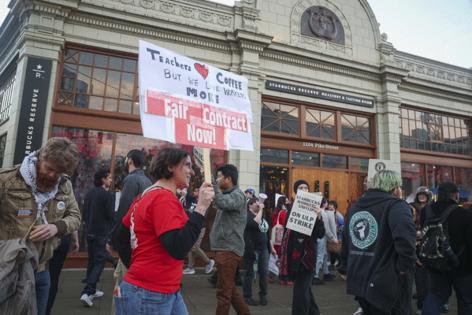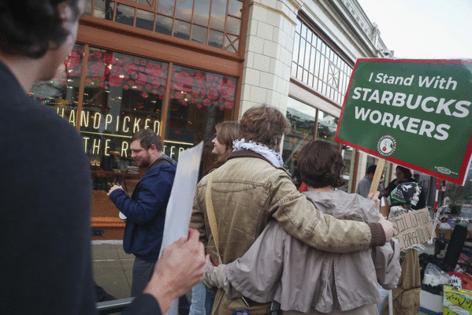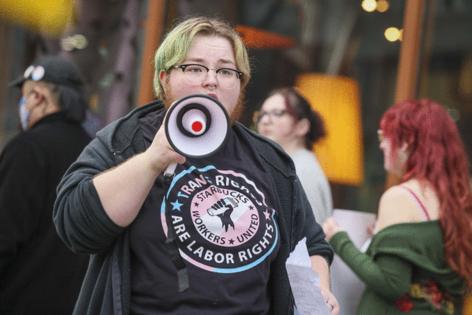Starbucks baristas call 5-day strike. Here's what to expect in Seattle
Published in Business News
Starbucks employees at unionized stores across the country began what they plan to be a series of escalating strikes Friday, launching a work stoppage at the coffee giant’s Seattle flagship cafe.
Starbucks Workers United, the union representing store workers, says it is prepared to keep the strike going through Christmas Eve. The union said in a news release that the strikes are hitting three of the company’s highest-priority markets — Chicago, Los Angeles and Seattle — during the busiest days of the year.
The union and the company on Tuesday had their final scheduled bargaining session of the year. Before the session, employees authorized a strike, giving the union the power to call one. That same day, the union announced that workers in the Sodo Reserve store located in Starbucks’ headquarters voted to unionize.
Unionized Starbucks workers did not walk off the job all at once. The union said the strike is expected to grow each day, affecting hundreds of stores by Christmas Eve.
Four stores in Seattle and one in Redmond were on strike Friday, according to the union. Workers there and at the other striking stores expect to continue all five days of the labor action.
Workers at the Reserve Roastery on Capitol Hill, the flagship location of Starbucks’ line of premium stores, said they began picketing Friday morning and never opened the store.
“There are managers in there but they’re really just tidying up,” said Mari Cosgrove, a barista at the Roastery. “We haven’t been open all day. They couldn’t open without us — we take 50 people to run it normally.”
Aside from a few disappointed tourists who ventured up the hill from downtown, Cosgrove said the community was supportive of the strike. People passed by and shouted encouragement or honked their horns. Some even dropped by with boxes from Pagliacci Pizza and the recently opened Voodoo Doughnut nearby.
“People are understandably disappointed that we’re closed,” Cosgrove said. “But I think people in this community understand that we don’t want to be closed. We want to be at work.”
As of Friday there hadn’t been a significant disruption to the company’s operations outside of a handful of stores, according to Starbucks. The company said just 10 out of more than 10,000 stores did not open as planned Friday.
The union said the strike was triggered by a lack of progress during contract negotiations. Starbucks made a commitment to reach an agreement this year, which it failed to do, according to the union.
Starbucks has been accused of anti-union activity. The union claimed the company shuttered some stores rather than let them continue as union shops. The company blamed lease expirations, facility constraints and public safety concerns. The NLRB filed a complaint in December 2023 saying that it wanted Starbucks to reopen the stores, eight of which were in Seattle.
But tensions eased earlier this year. The union and Starbucks announced in February that they were committed to reaching an agreement this year and bargaining resumed.
Both sides have since put forward dozens of proposals, according to the union. But despite hundreds of hours of bargaining sessions, Starbucks Workers United said the company hasn’t met the wage increases the union wants.
“We were ready to bring the foundational framework home this year, but Starbucks wasn’t,” Starbucks Workers United president Lynne Fox said in a news release. “After all Starbucks has said about how they value partners throughout the system, we refuse to accept zero immediate investment in baristas’ wages and no resolution of the hundreds of outstanding unfair labor practices.”
Starbucks spokesperson Phil Gee said in an emailed statement that the union prematurely ended the bargaining session this week. He also said it was disappointing the union didn’t return to the table, given the progress that was made this year.
Gee said the union’s ask — an immediate 64% increase in the minimum wage of hourly workers, and a 77% hike over the life of a three-year contract — was not sustainable.
“We are focused on enhancing the (employee) experience, with over $3 billion invested in the last three years,” Gee said. “Starbucks offers a competitive average pay of over $18 per hour, and best-in-class benefits. Taken together they are worth an average of $30 per hour for baristas who work at least 20 hours per week.”
Workers at the Roastery described a disconnect between the elevated position Starbucks puts them in and how the company treats them. Cosgrove said the company likes to tout the higher pay and the more prestigious work of the Roastery, but workers still feel treated like cogs in a machine.
“We have more benefits but we also have more high-volume days,” Cosgrove said. “And it’s like we’re putting on shows for the customers.
“Starbucks wants us to be a centerpiece but we’re not treated like it.”
The feeling of being in a fishbowl is felt by other workers at the Roastery.
“The working conditions can be rough, especially in the summer,” said Ren Baker, a shift supervisor. “They won’t do things like make a line outside of the store so it’s manageable inside. It’s just a completely different environment from a normal store.”
And since it’s a flagship location, workers say there’s an expectation to elevate the experience for customers.
“There used to be a lot more focus on customers,” Cosgrove said. “Nowadays, we’re so spread thin that if I want to provide that for the customer then I’m not helping my teammates.”
Aside from wages and staffing levels, another sticking point for the union has been scheduling. The union wants more predictable scheduling, guaranteed minimum hours for employees and full-time status for those who work 32 hours a week.
“As a shift supervisor, one of the requirements is that I give Starbucks 100 hours of my availability a week,” said Caitlin Caughlin, another Roastery worker picketing Friday. “It’s incredibility difficult to have a life when I never know what my schedule is.”
The union represents more than 500 stores across the country, which is a little more than 3% of all U.S. Starbucks locations.
©2024 The Seattle Times. Visit seattletimes.com. Distributed by Tribune Content Agency, LLC.

















Comments